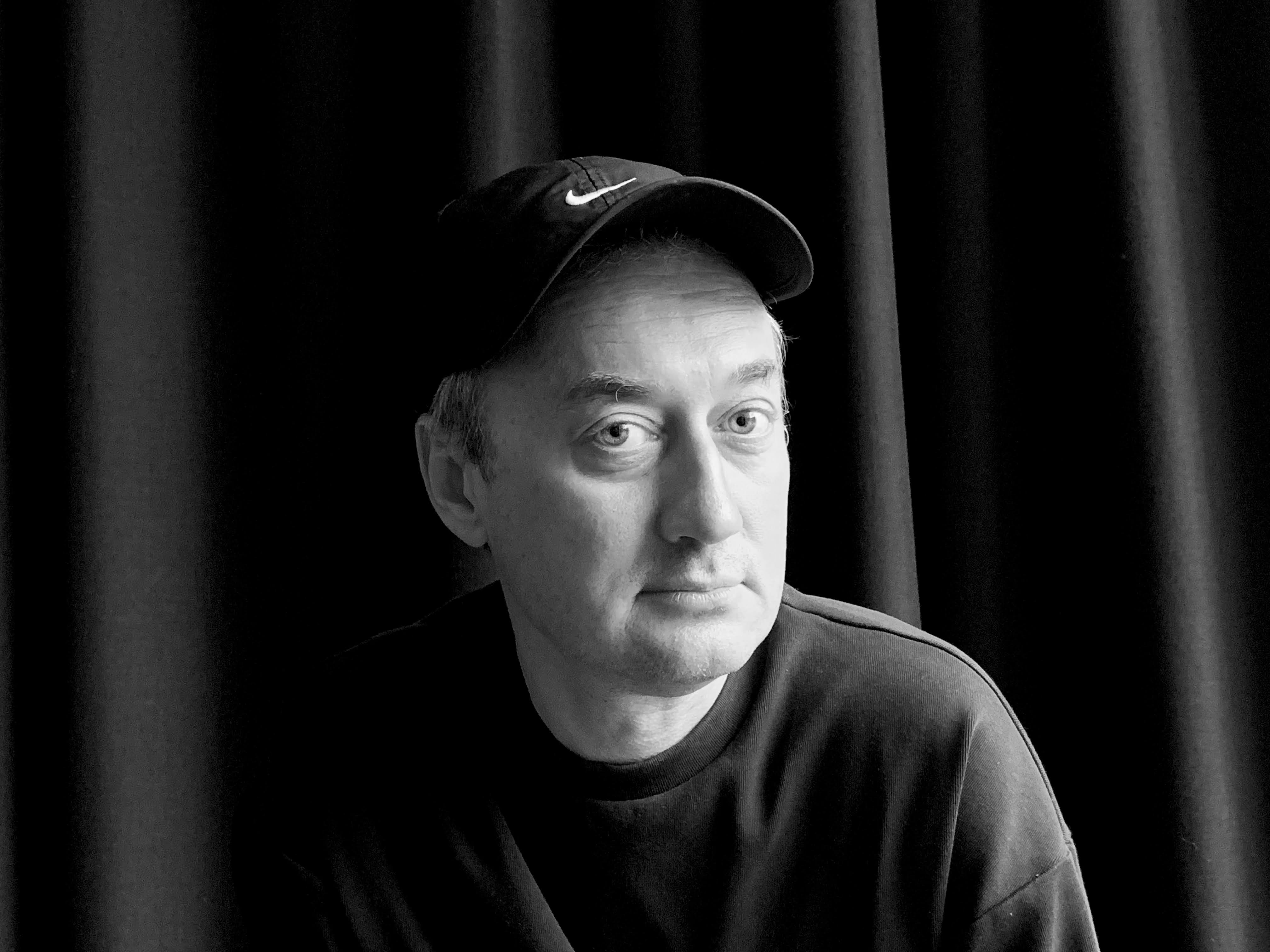»For many years I have thought about what the Nordics really are«
When the big lizard and the little E.T.-like figure sing loving arias in autotune, you forget they're not real. Two performers from the Oslo duo Only Slimes move in front of the screen and add body to the lizard and E.T., which is not brown, but in fresh bright colors, like the fantastic palm beach they sit on while they talk about existence. This absurd avatar-hyperpop-computer game-opera bears the title Afterlife.
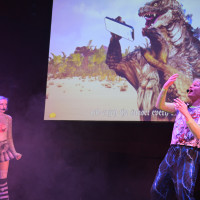
Meanwhile, composers from all over the Nordics are landing in Glasgow. One has traveled for two days from Lofoten, another has traveled by train for 27 hours from Copenhagen, a third asks in the Danes’ group on Facebook where he should give his presentation. Nordic Music Days is packed with conferences, concerts, workshops and sound walks. Here at the world's oldest festival for Nordic contemporary music, once called Nordiske Musikdage, has since 1888 taken turns in the Nordic countries with detours to Paris and London. This year the composers chose Glasgow.
It sounds like they are cutting up the marble with their instruments
»For the complexity and beauty of contemporary music«
»Status!« It is written in capital letters on the festival's first workshop where music industry people discuss the value of culture in a world in crisis. Operarejsen [The Opera Journey, a TV series] is highlighted because it has taught the Danes to really enjoy opera music. A representative from a Greenlandic festival talks about the work for greater inclusion of indigenous people in the Arctic. Some composers help each other via a Whatsapp group, others have dinner together – it's important that composers get out of their own bubbles.
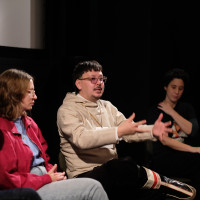
Everyone envies the representative from the organization Contemporary Music for All. That sounds like paradise, yes, but isn't it just wishful thinking with all that inclusion?
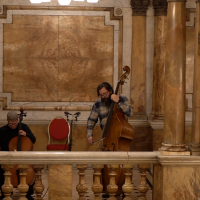
The Norwegian quartet Lemur are not pandering to anyone in the majestic Glasgow City Chambers. It sounds like they are cutting up the marble with their instruments. Flute, cello, horn and double bass make the building resound like a power plant – and they drill until electronic drones form in the air.
»Should we be Nordic? Can we be Nordic?«
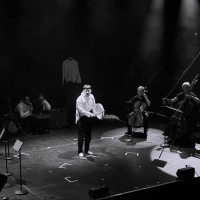
While the Scottish Ensemble updates folk music in the company of Greenlandic musicians, sound artist Jonas Struck sits in a cinema elsewhere in the city for a Q&A about the hit film Apolonia, Apolonia.
For four years, people in Scotland and the Nordics have worked to create this festival. And the chairman of the Nordic composers can't get his hands down at finally standing here in Glasgow with politicians, ambassadors and actors from the world of music. This is a bridge that unites the Nordics and Scotland, and as they say from the stage: »We're united in the face of challenges«. And further: »Should we be Nordic? Can we be Nordic? Please go back and tell your countries that Scotland wants to collaborate. We want to be part of your networks that enrich our lives.« And then: »I would like to propose the first toast. For the complexity and beauty of contemporary music!«
A Danish sound artist listens to the speakers and understands. He himself has sailed around in a boat in the Scottish archipelago of the Shetland Islands recording sounds and there experienced that everything about the Vikings and their ravages has been forgotten. The cohesion with the Nordic countries is great, and everybody knows that the Shetland Islands lie geographically in line with Norway.
The honorary award goes to Andy Saunders, a Scottish composer, who thanks thus:
»I should have taken a black turtleneck on to look more Nordic«
The clichés live on, even sober. But you can feel that the Scots are making themselves delicious. They want this so much.
Erkki Kurenniemi, the synthesizer pioneer from Helsinki, has not lived in vain
We are all connected!
A group of workers are digging up a central street and keep warm by listening to loud EDM. Glasgow is Scotland's largest city and the third largest in Great Britain. Glaswegians have cultivated and refined shipbuilding, whiskey and football throughout the ages. Glasgow is also an official UNESCO city of music with festivals such as Sonica. And listen, what other city has Radio Buena Vida – a cafe that faithfully transmits radio from a small studio behind a curtain in a corner of the cafe?
During Nordic Music Days, the audience has the opportunity to disappear into Danish Christian Winther Christensen's quietly meditative piece Sextet (2014) or defunensemble's performance of Finnish Antti Auvinen's rabble Warp My Simone (2019) with sampled sounds and a rave-happy flute, which for 12 consciousness-expanding minutes weaves in and out of each other like a boisterous mad-genius fugue. Erkki Kurenniemi, the synthesizer pioneer from Helsinki, has not lived in vain.
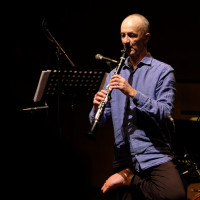
No, not all music from the dark north sounds dark. There are bright sounds from Icelandic nature, and the performer Mikko Raasakka delivers a piece standing on a really fresh colored yoga mat. But shall we talk ambience, then many of the listed works from Sweden, Denmark, Finland, Greenland, Iceland, the Faroe Islands and Scotland (don’t you forget about us!) beat the Darktronica that Glasgow's in-venue The Rum Schack is presenting for Halloween.
»We are going on a journey. For over an hour it will be like looking into a wall,« says Danish-American composer Lil Lacy. The image does not move in the film version of the work You’re Somehow Connected. We see a large industrial hall with a forest of microphones. We just have to concentrate on listening,
We are constantly starting new musical trips, and the Finnish delegation has not emigrated as during the Nordiske Musikdage (yes, that's what it was once called) in Copenhagen.
Now the Norwegian ambassador in Great Britain also crashes the Danes’ table. It is hyggeligt, nicer, here
An unusual journey
There are news in the Danes’ group. The Danish Embassy and Art Music Denmark are inviting us to dinner. Scottish monkfish in a tangy tamarind and red chili sauce is exciting, but Bent Sørensen, Rune Glerup and Alexander Tillegreen are spicier when they talk about how they compose. Sørensen – recipient of the Nordic Council's Music Prize in 1996 – does not use a computer. Glerup – who received the same award just a few days ago – uses a computer and manual labor. Tillegreen uses only a computer. Sørensen concludes: »Yes, because you can't write electronic music by hand.« There is also a man sitting at the table with a huge Halloween cake in a bag, which he has been carrying around all day. He is Scotland's Minister for Culture. Now the Norwegian ambassador in Great Britain also crashes the Danes’ table. It is more hyggeligt, nicer, here. But suddenly they all run across the street to the Old Fruit Market. This evening's program is named An extraordinary voyage!
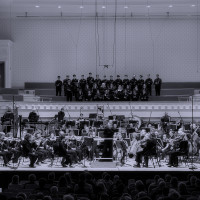
The BBC Scottish Symphony Orchestra performs Eli Tausen á Lavas’ Let me cry, a minimalist treatment of Händel's theme »lascia ch'io pianga«, which, in the young Faroese composer's own words, sounds like when »the sand dunes of the Sahara being gently sculpted by the desert winds.« Even larger sonorous worlds bask in Norwegian Maja S K Ratkje's trombone concerto Considering Icarus, while the earth rumbles in Chernobyl-composer Hildur Guðnadóttir's interpretation of the world's state of affairs in The Fact of the Matter. Human voices from the University of Glasgow Chapel Choir are very gentle. An Icelandic choir would probably have painted it with a more pitch-black brush.
Then there is a club night at the art center CCA. Voices speak in the middle of an electronic soundscape.
Alexander Tillegreen’s Phantom Streams works with psychoacoustics and word illusions; you hear words in the language you know best. The subconscious forms words that may not be there acoustically at all. The listener is a co-composer, and a woman thinks she hears »porn« and »bomb«. Tillegreen smiles: »Come back tomorrow and listen to the piece in ambisonic.«
Two Swedish composers at the back of the room look as if they rather wanted to swipe to a completely different digital reality
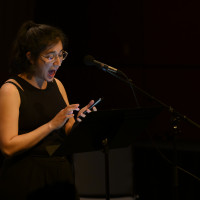
A soprano calls in the next room. Stephanie Lamprea performs Andrej Andric’s I Play You Play for voice and mobile phone. The composer from Aarhus sits concentrated on a chair and listens to the computer-generated text, as if it were a mathematical equation that needs to go up and deliver a sound like in a dating app. Electronic sounds are chasing the voice in their own algorithmic ways, always on the move.
Two Swedish composers at the back of the room look as if they rather wanted to swipe to a completely different digital reality.
»I didn't have much left for the whole Nordic thing«
Although outwardly, to the Scots, they may appear as a homogeneous group of Nordic composers, then not everyone knows each other. In the hotel's restaurant – among composers who are either for a continental breakfast (even local blood sausage) or Nordic minimalism (toast and jam) – sits Danish composer Rune Glerup, just arrived from Reykjavik, where he received Scandinavia's most important cultural prize, the Nordic Council's Music Prize, for the work About Light and Lightness (2022).
»When you're up there, you clearly feel how important cooperation in the Nordics is. Everything is about Nordic cooperation. And then you travel here to Glasgow, for the Nordic Music Days, which are pretty much the same thing. I once thought it was a strange dogma to hold a festival with only Nordic music – because music is just music, no matter where the music comes from. But actually it is very interesting and perhaps also important for the Nordic regions that there is a place where we exchange, because that is what we do when we go to concerts and listen to music made by our colleagues. And hopefully there will also be people in the audience who are not composers and industry professionals,« Glerup laughs.
»Here you get a bigger picture of what is going on musically«
»Here you get a bigger picture of what is going on musically. In the Nordic countries, we are somewhat isolated from each other. Of course, there are festivals where all kinds of music is played, but in the larger institutions, the symphony orchestras and the operas, it is the rule that in Denmark a lot of Danish music is played, and in Norway a lot of Norwegian music is played, etc. When you go to concerts in your own country, you miss hearing what is going on elsewhere. In Reykjavik, I felt how proud the politicians are that the Nordic countries are getting a lot of attention and that many want to cooperate. However, the cultural exchange is much more abstract in its form than political cooperation agreements. What does it mean that last night in Glasgow we heard a work by Brita Byström? The effect may not be as concrete as a political cooperation agreement, but in the long term I believe that it can potentially mean more, because it is something that is stored in our consciousness. It is important to us as individuals,« says the 43-year-old Glerup, who as a young man did what he could to travel away.
»I was probably young and naive and thought I should be a modernist, like the others – real German and real French«
»So, early in my career I looked towards Central Europe and Central European modernism. I must say that when I was in my twenties, I didn't have much left for the whole Nordic thing. It was very national and closed, I felt. Around the turn of the millennium, not much non-Danish music was played, not even at festivals. The Internet had been invented, but not Spotify and YouTube, so it was very difficult to find out what was happening musically. For several years I lived in Berlin and Paris and was very interested in all the currents there, which were completely different from the currents in Denmark at the time. You learn a lot about another culture, but you also learn a lot about yourself. And I was probably young and naive and thought I should be a modernist, like the others – real German and real French. And then you just discover that you are not at all. And you never become one, although of course there are influences from there.«
You can't run away from the fact that your luggage matters, says Glerup:
»You can clearly hear the Central European influence in my earlier works. But in the violin concerto it is clearly a shift back to the Nordic. For many years I have thought about what it really is, the Nordic. And it is also connected with my own life – that is, in my childhood we moved around a lot, so I was very rootless. But there is one thing that has stuck, and that is the summers in my grandparents' summer house on the west coast of Jutland: the nature, the air, the light... That atmosphere is found in my music, especially in the violin concerto, even if it starts with a rate, which is tumultuous – perhaps a picture of the rootlessness of my life. So it's probably a search for who you are. And you can say that my early period was very forced and rebellious, and I thought that the musical world – around the turn of the millennium – had to be bigger than the Danish one with Per Nørgård at its head, whom I have nothing against, by the way, but then something more just had to happen. Now I feel more distant from Central European modernism, which is very much about language, form and style, and is more interested in what I can do with the material,« says Glerup, about whom the Nordic Council's prize committee wrote a few days earlier:
»Glerup conjures up an unmistakable vulnerability, which forms part of a beautiful balance with his more objective, sculptural and crystal clear soundscapes.«
Glerup's work About Light and Lightness will be performed tomorrow in Glasgow, but tonight it is to be played in Edinburgh tonight. The traveling composer gets up from the table. Continental breakfast is over.
Last call: with or without a black turtleneck
The Necropolis is a Victorian cemetery located on a hill to the east of Glasgow Cathedral. Here Olga Szymula from Aarhus has created the soundwalk directly to directly from. Someone whispers into my headphones, others speak in slightly distorted voices, as I move around among ancient crypts and lavish monuments in the city of the dead.
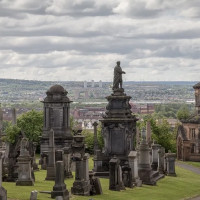
The phone beeps. People check out of the Danes’ group. The festival is drawing to a close. This is the last chance to buy the book Becoming a Composer. Now the educational journey ends. The Nordic composers must go home to where they come from. That's the rule with educational journeys: You have to go out to discover yourself and where you come from.
Some of the participants stay a few extra days. A management group is to discuss the future of this festival. Should it be a biennale? Who will pay?
»For those still standing on Sunday – don't forget to sign up for the closing cèilidh«. The Nordic Music Days must end with a traditional Scottish dance, so that the composers do not forget their newly acquired friends in Scotland. Surely there is always room for one more in the Nordic cousin club? With or without black turtleneck.
Nordic Music Days, October 30-3 November, Glasgow.
English translation: Andreo Michaelo Mielczarek
Proof reading: Seb Doubinsky






